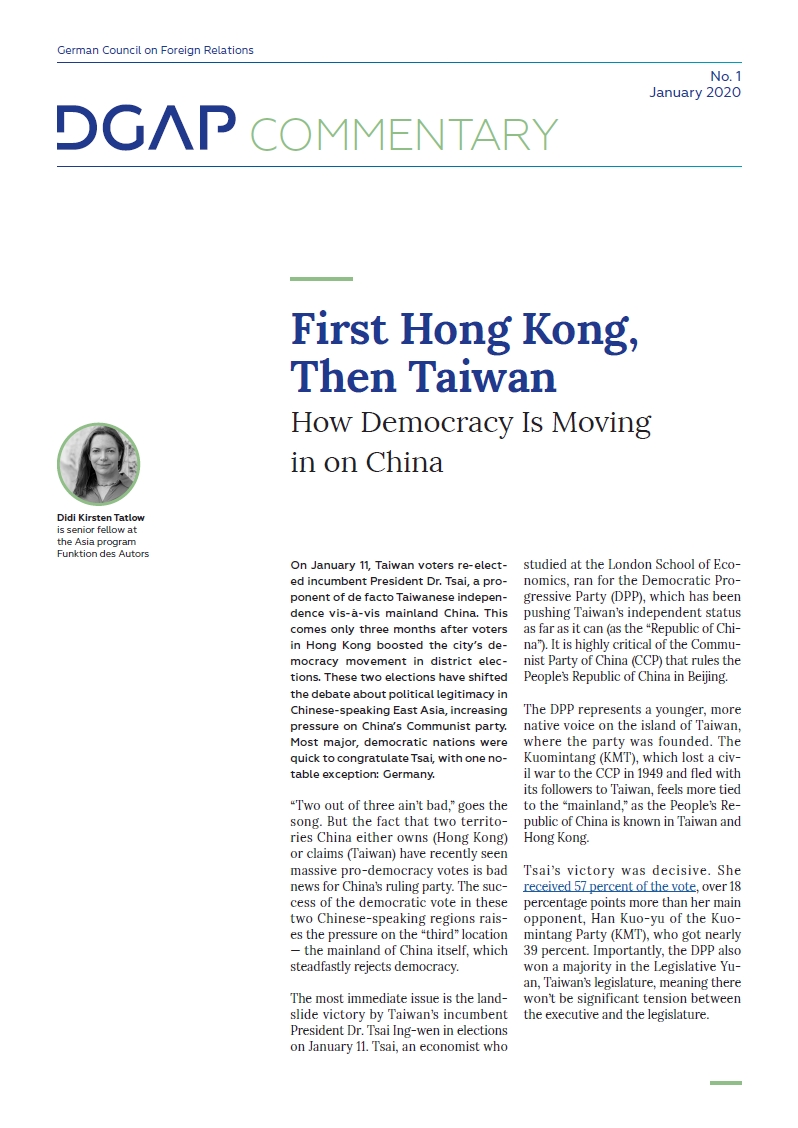“Two out of three ain’t bad,” goes the song. But the fact that two territories China either owns (Hong Kong) or claims (Taiwan) have recently seen massive pro-democracy votes is bad news for China’s ruling party. The success of the democratic vote in these two Chinese-speaking regions raises the pressure on the “third” location — the mainland of China itself, which steadfastly rejects democracy.
The most immediate issue is the landslide victory by Taiwan’s incumbent President Dr. Tsai Ing-wen in elections on January 11. Tsai, an economist who studied at the London School of Economics, ran for the Democratic Progressive Party (DPP), which has been pushing Taiwan’s independent status as far as it can (as the “Republic of China”). It is highly critical of the Communist Party of China (CCP) that rules the People’s Republic of China in Beijing.
The DPP represents a younger, more native voice on the island of Taiwan, where the party was founded. The Kuomintang (KMT), which lost a civil war to the CCP in 1949 and fled with its followers to Taiwan, feels more tied to the “mainland,” as the People’s Republic of China is known in Taiwan and Hong Kong.
Tsai’s victory was decisive. She received 57 percent of the vote, over 18 percentage points more than her main opponent, Han Kuo-yu of the Kuomintang Party (KMT), who got nearly 39 percent. Importantly, the DPP also won a majority in the Legislative Yuan, Taiwan’s legislature, meaning there won’t be significant tension between the executive and the legislature.
Add on the recent vote in Hong Kong, and the situation becomes even more interesting. Hong Kong doesn’t have elections for the leadership of the territory, a point that has rankled there for years, fueling protests that erupted in 2014, again in June 2018, and continue today. Last November, after months of protests against the CCP’s growing influence in Hong Kong, district-level elections recorded a massive victory for pro-democracy candidates who won 392 out of 452 seats. In Hong Kong, as in Taiwan, turnout was high and the voting day was peaceful.
So in only three months, two territories with 30 million Chinese-speaking people voted in democratic elections, and, in both cases, an overwhelming majority chose parties or candidates that are critical of, or reject, the CCP.
This matters because Beijing wants Taiwan to accept the same deal that Hong Kong got when it reverted to Chinese rule in 1997: “One Country, Two Systems,” a formula that promised a “high degree of autonomy.” In her victory speech, Tsai ruled that model out — not for the first time and knowing that this vote will strengthen her position. The example of violence-torn Hong Kong certainly contributed to the size of her victory, as most of those in Taiwan see Beijing’s formula as unworkable and want to protect their de facto sovereignty.
Officially, the vote changed little: The world still recognizes Beijing and not Taiwan.
But in reality and on the ground, the election has significantly shifted the debate about political legitimacy in Chinese-speaking East Asia. It has also increased pressure on Xi Jinping, the general secretary of the CCP. This further raises the cost, should China decide to invade Taiwan or take over Hong Kong by force. It reserves the right to do both.
Internationally, the congratulations to President Tsai in Taiwan started flowing during the weekend of January 11. By Monday, January 13, the United States, Japan, Australia, Britain, France, and the European Union had made statements wishing Tsai well and praising the event, in various formulations.
Beijing reacted sharply, as expected: “The election in the Taiwan region is a sub-national affair in China,” foreign ministry spokesman Geng Shuang said, adding “we deplore and firmly oppose” the well-wishes. Xinhua, China’s state news agency, was harsher: “Tsai and the DPP used dirty tactics such as cheating, repression, and intimidation to get votes, fully exposing their selfish, greedy, and evil nature,” Xinhua wrote, also blaming “anti-China forces in the West.” Foreign Minister Wang Yi went even further, using a phrase that translates literally as “separatists [will] leave a stink for 10,000 years,” the Straits Times reported.
Yet among democratic nations, Germany was a notable exception. Berlin did not issue a special statement but waited until the regular, weekday government media conference to comment. Asked why, a foreign ministry spokeswoman said they knew a question would be coming and thought the format was “the appropriate place” for it.
Then Steffen Seibert, the government spokesman, said: “We noted the reports about these parliamentary and presidential elections; we welcome that they were free and democratic votes conducted smoothly and peacefully. Our interest in peace and stability in the Taiwan Strait remains unchanged, and we expect both sides contribute to a peaceful reconciliation and reduction of tensions.”
By not immediately or overtly congratulating Tsai, Germany appears to have wanted to avoid being put in the CCP’s camp of “anti-China forces” excoriated by Xinhua — but it’s an empty gesture. Beijing is likely to see silence merely as its due. Germany swiftly joining in the congratulations with its allies and European neighbors, on the other hand, would have made it harder for Beijing to divide the EU further, raising the cost for China. And China, as it mulls it options over both Taiwan and Hong Kong, will certainly calculate costs.

